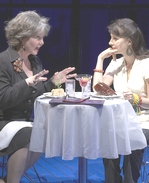SITE GUIDE
SEARCH
REVIEWS
REVIEW ARCHIVES
ADVERTISING AT CURTAINUP
FEATURES
NEWS
Etcetera and
Short Term Listings
LISTINGS
Broadway
Off-Broadway
NYC Restaurants
BOOKS and CDs
OTHER PLACES
Berkshires
London
California
New Jersey
DC
Connecticut
Philadelphia
Elsewhere
QUOTES
TKTS
PLAYWRIGHTS' ALBUMS
LETTERS TO EDITOR
FILM
LINKS
MISCELLANEOUS
Free Updates
Masthead
A CurtainUp Review
What We Once Felt
|
When I was a baby They labeled me a Tradepack. I should be hopeless, Like you. I should be suffering, Like you. I should be questioning, Questioning all of it, Wondering what all of it is for, Just Like You. —Violet |

Ellen Parker & Mia Barron
|
Another worthwhile offering by Lincoln Center's LCT3 series, What We Once Felt is a challenge not because it is difficult to understand, but because there is quite a lot to absorb as it considers humanity as irrevocably remade in the cause of sociological, political, and scientific necessity.
Healy has invented a rather depressing futuristic world inhabited only by women. The population is divided between those who are healthy and in charge called Keepers and those called The Tradepacks. Apparently the Tradepacks are the result of a science-gone-awry experiment and are being allowed to slowly become extinct, or as it is called making "a transition." Like much of science fiction literature, there is an ominous underlying warning and a foreboding about our future and this is certainly what is scarily present in this play.
The play has many interconnected stories and relationships, perhaps too many. Its main focus is on a woman named Macy (Mia Barron), a writer who is attempting to get her novel published in a time when publishing fiction has gone out of fashion. If Macy succeeds, her novel, which has a Tradepack as its heroine, will evidently be the last of its kind. Fevered by her anxiety, Macy can hardly believe that Astrid (Ellen Parker), her fast-talking agent has brokered a deal with Claire (Opal Alladin), a top publisher who speaks in clichés.
At first, Laura (Marsha Stephanie Blake), a line-reader assigned to edit and help further shape the novel appears to be working on Macy's behalf. But it's soon evident that she has an agenda of her own, one possibly in league with the powers in charge.
Under the direction of Ken Rus Schmoll, the fine cast appears in league with the play's mechanics, but possibly more as concepts than as real characters. However, this does not diminish any of them as a powerful presence. The set by designer Kris Stone is a formidable piece of stark futuristic mobility and a powerful presence on its own.
One of the subplots involves Benita (Lynn Hawley) and Yarrow (Ellen Parker) as a couple whose plan to get a baby simulated from an on-line source becomes a frightening risk when they are told they getting "an error." We are led to presume that it will be a Tradepack. This in turn explains the presence of Violet (Ronete Levenson), a character who serves to bookend the play as the narrator who has been traveling around the world giving hope and talking about "the transition." It takes the entire play for us to realize what she is talking about, but the device works as she steps aside to allow the play to proceed. . .call it a transition.
I'm not familiar with any of Healy's previous plays, but her daring subject matter and dialogue, much of it embedded with the lingo of the publishing world, is bracing. As a recent graduate of Brown's MFA program, I'm wondering if playwright Paula Vogel, who also delves into the realm of sci-fi, may not have been an active voice behind Healy.
With tickets at $20, this is a great way to not only discover a new and talented writer but also a play that covers new and uncharted territory. Just be forewarned as you jump into a future that isn't exactly rosy.
|
What We Once Felt By Ann Marie Healy Directed by Ken Rus Schmoll Cast: Ronete Levenson (Violet), Lynn Hawley (Cheryl, Benita, Paulina), Mia Barron (Macy), Ellen Parker (Astrid), Opal Alladin (Female Server, Joan) Marsha Stephanie Blake (Franny, Laura, Border Guard). Sets: Kris Stone Costumes: Linda Cho Lighting: Japhy Weideman Sound: Leah Gelpe Running Time: 2 hours including intermission Duke Theater, 229 West 42nd Streeet Tickets ($20) Previews began 10/26/09 Ends 11/21/09Opened Review by Simon Saltzman based on performance 11/14/09 |
|
REVIEW FEEDBACK Highlight one of the responses below and click "copy" or"CTRL+C"
Paste the highlighted text into the subject line (CTRL+ V): Feel free to add detailed comments in the body of the email. . .also the names and emails of any friends to whom you'd like us to forward a copy of this review. You can also contact us at Curtainup at Facebook or Curtainup at Twitter |
|
Subscribe to our FREE email updates with a note from editor Elyse Sommer about additions to the website -- with main page hot links to the latest features posted at our numerous locations. To subscribe,
E-mail: esommer@curtainup.comesommer@curtainup.com
put SUBSCRIBE CURTAINUP EMAIL UPDATE in the subject line and your full name and email address in the body of the message -- if you can spare a minute, tell us how you came to CurtainUp and from what part of the country. |






